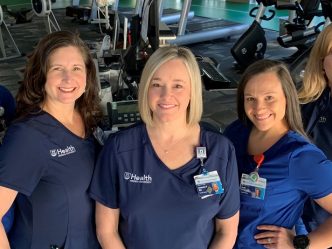Summer break means vacations, beaches, cookouts and more, but those who struggle with heart failure might need some extra support to join in on the summer festivities.
With this in mind, Augusta University’s Cardiovascular Center is working to help empower patients and families with the knowledge necessary to successfully manage heart failure.
Open to the entire Augusta community, the Heart Failure University program offers patients and families a free, multidisciplinary six-week program to help increase quality of life scores while lowering heart failure readmissions.
The classes are offered every Friday from 10-11 a.m. in the Cardiovascular Center and restart every six weeks. The classes do not need to be taken in any specific order, and interested participants can attend according to what works best with their schedule.
Currently, there is no need to register for classes, but you can contact the center to make sure seats are available.
Heart failure currently impacts almost 6 million people nationally. Closer to home, cardiovascular disease, which includes heart failure, is the leading cause of death in the state of Georgia with over 20,000 deaths each year. Augusta University’s program seeks to help patients and their families manage their diagnosis and lower readmission rates.
Thanks to various professionals throughout the health system, the classes are taught by AUMC nurses, dieticians, pharmacists, cardiac rehabilitation staff and hospital chaplains.
Heart Failure University Classes:
Week one: Understanding heart failure
- Taught by AU Medical Center nurse
- Week one gives an overview of heart failure, including types of heart failure, causes, diagnosis and testing.
Week two: Fluid management
- Taught by AU Medical Center nurse
- This class reviews sodium and fluid restrictions and daily weights. Offers hands-on, interactive instructions for managing 2,000-mg sodium diet, 2-liter fluid restrictions and correct daily weights. This class helps to empower patients with the knowledge necessary to implement dietary lifestyle changes.
Week three: Nutrition
- Taught by AU Medical Center dietician
- Dieticians can help patients and families to implement a healthy diet, including sodium restriction and addressing any particular dietary concerns like diabetes. This week also helps patients to make informed decisions when eating out.
Week four: Medications
- Taught by a pharmacist
- A pharmacist will cover heart failure medications, including indications and common side effects. Additionally, patient and family concerns regarding medication regimens will be addressed.
Week five: Exercise
- Taught by cardiac rehabilitation staff
- This week will cover exercise suggestions for different levels of fitness, led by an exercise physiologist. This class will help provide an understanding of how heart failure affects one’s energy levels and how to manage and conserve energy during everyday activities.
Week six: Coping
- Taught by a hospital chaplain
- This class is designed to help patients cope with the stress of heart failure diagnosis and the impact it has on patients and families.
For more information about the Heart Failure University or how to attend, contact Kirby Brown or call 706-446-5254.
 Augusta University
Augusta University


